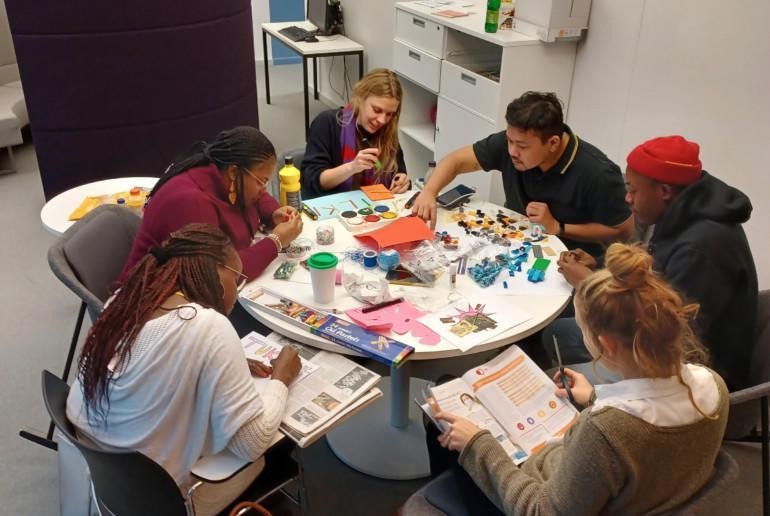International perspectives on eco-social change

– The opportunities are in fact great for the students because they can get different perspectives from different countries, from different academic traditions, tells Steffen Suur-Nuuja, one of the teachers from Norway VID Specialist University.
The BIP-course consists of online studies and the intensive course. Suur-Nuuja thanked the warm welcome from Diak and was amazed how quickly everyone on the course seemed to know each other well.
– It has been great to see all the different nations coming together and discussing. It feels like they have known each other for weeks or months. Before they have only been in contact online.
Suur-Nuuja was especially glad to see how well the students managed to work with complex topics and adopting their ideas.
– Seeing them adopt these ideas in the practical placements and the practical field, that’s probably the reason why a person like me wants to be a teacher, because you see the progress, thinks Suur-Nuuja.
Learning about eco-social change
Nora Li Gebhardt from DIT – Deggendorf Institute of Technology in Germany organized design thinking workshops during the intensive week, where students produced prototypes to solve challenges in eco-social change.
– The students have a good opportunity to learn something about the eco-social problems in other countries and connect them to what they experience in their own. They can also learn something about different ways to handle them, Gebhardt thinks.
According to Gebhardt, the best part during the week has been seeing the students return from their field trip being full of information and emotions, and they had a drive to share their impressions and to structure what they had learned.
– It was amazing to see how they worked together and shared their findings, Gebhardt says.

International networking with people from different backgrounds
Åsa Kneck works at Marie Cederschiöld University in Stockholm as a lecturer and researcher as well as an international coordinator in the nursing programme. She decided to participate in the BIP as a student to also learn abut organizing such a programme.
– I think it’s really good as a teacher to be a student every once in a while, because then you understand that you have assumptions that perhaps aren’t always going to happen.
Kneck was surprised about how eco-social change was strongly discussed from the social sustainability point of view alongside ecological sustainability.
– It has been very interesting for me to learn more about the Finnish system. We often think that Sweden and Finland are quite a like, but now I’ve learned also how organizing health care for undocumented people and asylum-seeking processes in Finland are different than in Sweden, tells Kneck.
Kneck feels that it has been challenging but also interesting to work together with people from different ages and different countries, with different backgrounds.
– That’s what I challenge my students to do when we have international cooperation, but now I challenge myself to do that, and it has been really nice.
Kneck thinks that BIP as a concept is great, because it makes it possible to get international experience even if you don’t have a possibility to go for a longer exchange. With BIP you can have a lot of international collaboration, but you only spend a week in another country.
Kneck believes that even though the course is very intense, and it might be a bit tiring, because you interact with people all the time, the course and it’s intensity has also been rewarding and offers good possibilities for networking.
– As a teacher I got a network now with the other BIP teachers and I think it’s the same for students. When you join a BIP, you get to meet other people that are interested in the same field, perhaps not the same profession or the same discipline, but they are interested in the same questions, and that enables getting a broader network and enhancing your possibilities for further collaboration, feels Kneck.

BIP makes your brain work
Selma Hellman did her degree of Bachelor of Social Services in Diak and now she is doing her masters in Community development and social innovation in Norway at VID Specialized University. Hellman wanted to participate in the BIP, because she wanted to learn more about the current topics: sustainability and ecosystem and protecting it.
– I also wanted to come back to Diak, because I miss Finland and this school, adds Hellman.
According to Hellman, the best part has been getting to meet people.
– You get to meet people from different countries. We met online in our groups and being able to now meet in real life and interact has been great. We have these warm-up games, which I think is really cool, because it’s fun, you get to do something different, tells Hellman.
Hellman recommends participating in BIP, since people should learn about how many things are strongly connected and you learn a lot during the course.
– If you get more theoretic information as a background, maybe you can apply them better in practice, how to be sustainable and consider the nature.
Hellman also felt it was great to meet people that are really passionate about their studies. There are a lot of brainstorming and debates during the course.
– An intensive course is a good way to learn because you really make your brain work!

What is BIP?
- BIP (Blended Intensive Programme) is a diverse intensive course that offers the opportunity to network and strengthen your own professional skills in an international environment.
- Consists of an online study period and an intensive course at a partner university.
- Offers flexible mobility opportunities, especially for students interested in a short-term international learning experience or an exchange period.
- Is aimed at students of all fields and different annual courses.
- Additional information on the website.

